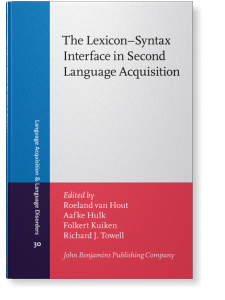The Lexicon–Syntax Interface in Second Language Acquisition
Editors
Second language acquisition has to integrate the totality of the SLA process, which includes both the learning of the core syntax of a language and the learning of the lexical items that have to be incorporated into that syntax. But these two domains involve different kinds of learning. Syntax is learnt through a process of implementing a particular set of universal structures, whereas the learning of lexis is characterised by the building up of associations (or connections). Yet these two systems must come together in the creation of a whole linguistic system in the mind of an individual. This book is designed to state the implications of these two paradigms in as clear a way as possible through examples of the research carried out within each paradigm and to examine how they can be made to inter-relate in a way which would enable us to explain better the overall process of SLA.
[Language Acquisition and Language Disorders, 30] 2003. viii, 234 pp.
Publishing status: Available
Published online on 21 October 2008
Published online on 21 October 2008
© John Benjamins Publishing Company
Table of Contents
-
Acknowledgments
-
1. Introduction: Second language acquisition research in search of an interfaceRichard J. Towell | pp. 1–20
-
2. Locating the source of defective past tense marking in advanced L2 English speakersRoger Hawkins and Sarah Ann Liszka | pp. 21–44
-
3. Perfect projectionsNorbert Corver | pp. 45–68
-
4. L1 features in the L2 outputIneke van de Craats | pp. 69–95
-
5. Measures of competent gradienceNigel Duffield | pp. 97–127
-
6. Lexical storage and retrieval in bilingualsTon Dijkstra | pp. 129–150
-
7. Inducing abstract linguistic representations: Human and connectionist learning of noun classesJohn N. Williams | pp. 151–174
-
8. Neural substrates of representation and processing of a second languageLaura L. Sabourin and Marco Haverkort | pp. 175–195
-
9. Neural basis of lexicon and grammar in L2 acquisition: The convergence hypothesisDavid W. Green | pp. 197–218
-
10. The interface: Concluding remarksRoeland van Hout, Aafke Hulk and Folkert Kuiken | pp. 219–226
-
Name index | pp. 227–228
-
Subject index | pp. 229–232
“This work represents the latest developments in the generative/psycholinguistic studies of second language acquisition. It will certainly advance our understanding of this important area of study.”
Liang Chen, University of Georgia, in Language Vol. 81(4), 2006
“All of the chapters are well written, discuss important questions in L2 acquisition research, and use a variety of research methodologies and populations. For these reasons, this book makes an excellent contribution to linguistics, psychology and L2 acquisition. I highly recommend it for graduate students and researchers interested in any of these fields or approaches to L2 acquisition and bilingualism. The editors should be applauded for attempting to bridge the gap between these two often competing approaches to L2 acquisition and for showing that there is much to be gained by bringing the two perspectives together. I hope this book encourages more dialogue and collaboration between researchers in linguistics and psychology.”
Silvina Montrul, Univeristy of Illinois at Urbana-Champaign, in The Modern Language Journal 90(1), 2006
“The volume is an insightful and meticulously selected and organised collection of papers on the latest developments in the generative/psycholinguistic studies of L2 grammar. Towell's introduction to the volume goes much beyond an ordinary introduction to papers in a collection: it beautifully contextualises the contributions in generative and psychological paradigms of research in general and the implications for SLA research in particular.”
Ahmad Reza Lofti, University at Khorasgan, on Linguist List 15-646, 2004
Cited by (12)
Cited by 12 other publications
Ingham, Jacqueline
Grevisse, Daniel Grégoire, Marzena Watorek & Frédéric Isel
Norhan, Aslam, Fatimah Hani Hassan, Rogayah A Razak & Mohd Azmarul A Aziz
Alonso González, Vanesa
Shimanskaya, Elena & Tania Leal
Ayoun, Dalila
Hopp, Holger, Teresa Kieseier, Markus Vogelbacher & Dieter Thoma
2018. L1 effects in the early L3 acquisition of vocabulary and grammar. In Foreign Language Education in Multilingual Classrooms [Hamburg Studies on Linguistic Diversity, 7], ► pp. 305 ff. 
HWANG, Hyesung G. & Lori MARKSON
Shi, Lu-Feng
Hall, Christopher J., Denise Newbrand, Peter Ecke, Ulrike Sperr, Vanessa Marchand & Lisa Hayes
This list is based on CrossRef data as of 16 september 2024. Please note that it may not be complete. Sources presented here have been supplied by the respective publishers. Any errors therein should be reported to them.
Subjects
Main BIC Subject
CFDC: Language acquisition
Main BISAC Subject
LAN009000: LANGUAGE ARTS & DISCIPLINES / Linguistics / General
